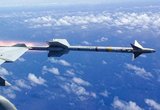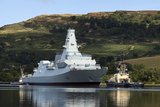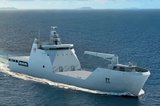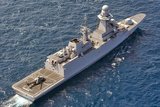Iran caught UK by surprise in Gulf: audio company
The man behind the audio recording of Iran's seizure of a British-flagged tanker in the Gulf says the episode played out over a 20-40 minute period while a UK warship raced in from an hour away – too far to be of any help.
The HMS Montrose ‘really didn't have much chance of having an impact on the scene,’ Dryad Global shipping risk management company head Philip Diacon told AFP.
Diacon refused to discuss how his London-based firm obtained the audio of 19 July’s high-seas drama over the Stena Impero.
But he said the entire exchange was conducted over an open channel – number 16 – which is used globally by military and commercial vessels to send out calls.
Britain's helplessness in the situation has seen Foreign Secretary Jeremy Hunt get accused of devoting too much time to his UK leadership bid and not enough to his diplomatic duties.
Diacon agreed that ‘this obviously did, to an extent, catch the UK by surprise’.
‘The shipping industry was not really prepared for this.’
He added that his global clients were starting to look for alternatives to using British-flagged vessels in the flashpoint region.
Almost a fifth of the world's oil passes through the 21-mile (33km) strait between Iran to the north and the UAE to the south.
‘Normally it's the British-flagged, US-flagged and Saudi-interest vessels that are the most likely to be targeted,’ Diacon said.
It takes at least a month for most shippers to complete the paperwork needed to have their vessels registered under a different national flag.
Diacon said most were now looking to China – a major player in the Gulf region that Iran views as an important ally.
‘We are starting to see talk of moving to Chinese-flagged vessels,’ said Diacon.
‘Oil will continue to flow. The Iranians have no interests in disrupting other nations.’
Diacon pointed out that about a hundred tankers go through the Strait of Hormuz in any 24-hour period and that accompanying each one was simply impossible at this stage.
The US is pressing other nations to join it in a proposed Gulf convoy system that was last used during the ‘Tanker War’ of the late 1980s.
But Britain and other European governments are cautious.
They fear the convoys could spark a broader military operation that could result in all-out war.
Hunt told parliament on 22 July that Britain was planning a European-led protection force for the Gulf that ‘will not be part of the US maximum pressure policy on Iran because we remain committed to preserving the Iran nuclear agreement.’
The US pulled out of the landmark deal last year and tensions with Tehran have risen steadily since.
‘All governments will be under extreme pressure now to do something,’ said Diacon.
But ‘you need a lot of assets to do it effectively and you need buy-in from nations to support it,’ he said. ‘Warships are not the answer.’
More from Naval Warfare
-
![Australia signs US$2.8 billion ship deal with Austal but puts pressure on company to deliver]()
Australia signs US$2.8 billion ship deal with Austal but puts pressure on company to deliver
The A$4 billion Landing Craft Heavy contract for Austal follows on from a A$1 billion deal in December for Landing Craft Medium ships, but the Australian government has made it clear that a contract for Mogami frigates is reliant on the success of these two contracts.
-
![Turkey targets Italian market with strategic partnership on USVs and hybrid platforms]()
Turkey targets Italian market with strategic partnership on USVs and hybrid platforms
Havelsan, VN Maritime and Piloda Defence will collaborate to develop and integrate a range of maritime solutions with a view to secure a first procurement contract in Italy in the first half of this year.
-
![Could Asia and the Middle East offer growth opportunities for Italy’s Fincantieri?]()
Could Asia and the Middle East offer growth opportunities for Italy’s Fincantieri?
Export campaigns for Fincantieri’s submarines and frigates are central to the company’s ambitions as billions of dollars in unawarded contracts come into focus.





















